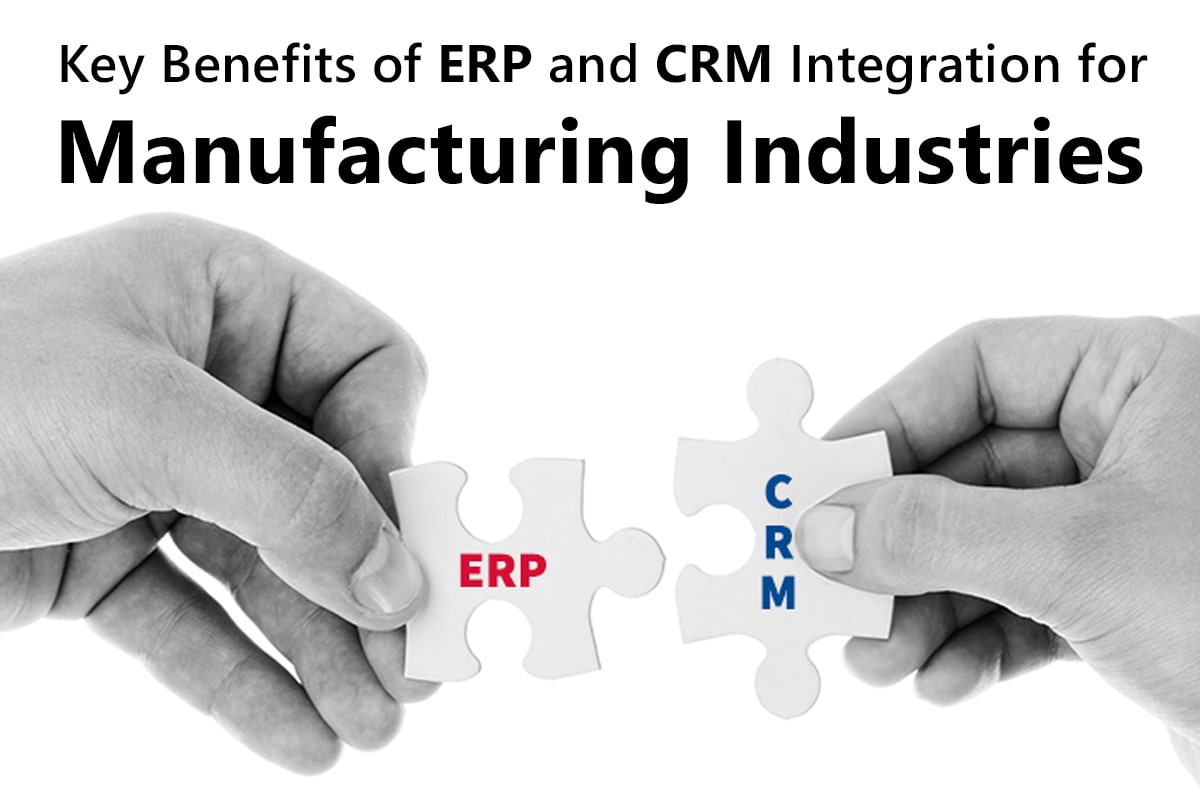ERP (Enterprise Resource Planning) and CRM (Customer Relationship Management) tools are widely used by the manufacturing industries to tackle the dynamic and complex business environment. ERP and CRM both have their own benefits and are being used by most manufacturing industries separately as per their business requirements. But now, with the dynamic and increasing demands from the customer side, the market has become more competitive than ever before. The nature of the competitive market has forced the industries to adopt new methodologies to respond quickly to these demands.
Many manufacturing industries are now looking at these software as an integrated solution rather than being used separately. Both products cater to the different functionalities of a business. While ERP focuses mainly on integrating and managing business processes like accounting, project management, material procurement, and supply chain operation, CRM focuses on business interaction with the customer throughout the business journey. Though these were seen as separate tools used by the industries for different advantages, here is detailed information on benefits one can get out of their integration.

Eliminate data entry and Record Duplication
Both ERP and CRM systems store similar data in objects like contacts and accounts. When the systems are used separately, the industry has to make sure the data in both systems should remain consistent. In a separate system, the new data entry and updates in data have to be done separately, and one has to ensure that there should not be any mismatch.
The potential error of data mismatch can be eliminated using the integrated solution of ERP and CRM. The tedious work of data entry for both systems can also be eliminated, and the data consistency is assured in an integrated solution. The ERP and CRM integration also removes the record duplication, and updates in records in any of the two systems will reflect in other.
Improved Quote Generation and Order Management
While quotes are generated in the CRM, the ERP manages orders and inventories. Integration bridges the gap between CRM quotations and ERP orders, streamlining the whole process. With the help of an integrated system, a proposal generated in CRM can be turned into orders which can be executed in the ERP system, reducing the data movement and data processing and making the process more efficient. An integrated system can also help generate quotes in CRM more accurately as sales representatives can get updated information on pricing from the integrated system.
Reduced Employee Training and IT Support Cost
While using both ERP and CRM systems separately, the cost for training employees for both tools will be much more than the training on a single integrated solution. The time required to train employees for both software individually can also be reduced when they are trained for the integrated solution. Apart from that, the number of employees trained in both systems will increase by training them for the integrated system. Similarly, the cost will be reduced when there is only one system to maintain and needs support compared to the support cost required for two different systems.
Improved Visibility and Account-based Forecasting
A CRM and ERP integration offers you a more holistic view of your customers by combining information from all of your different business areas, such as sales, marketing, manufacturing, production, quality assurance and finance. Increased visibility into your clients’ purchasing preferences and order history enables you to provide them with personalized experiences in real-time and make informed decisions about establishing relationships with them.
Suppose a manufacturing business is using Salesforce Manufacturing Cloud. In that case, features like account-based forecasting can be helpful in defining the order and demand forecast algorithm, which will take into account the various factors influencing forecasting. Account-based forecasting also allows you to tailor the forecast algorithm to meet your own company’s needs. With the integrated system, Sales representatives can have visibility on purchase history and order details which can be helpful for better forecasting.
Improved Employee Collaboration
The integrated solution provides consistent, real-time, and updated data to all the departments, eliminating the potential issue created by data mismatch. With the availability of common data throughout the collaborating departments, productivity increases. Teams can collaborate better with the required access to information from different departments. When employees across your organization have real-time access to the complete customer information on purchase preferences, orders details, sales agreement, bill of materials, contracts, they can work together to support customers more effectively. The integrated solution helps to provide comprehensive information on front-end (CRM) processes and back-end (ERP) processes, which further improves employee collaboration.
Conclusion:
ERP and CRM integration has much more to offer than its individual use for a manufacturing industry. As the market and manufacturing industries are being more customer-centric, industries that are currently relying only on ERP systems will need a focused CRM system like Salesforce to get the most out of the Salesforce manufacturing cloud and to manage the business interaction with the customer in the longer run. To remain competitive in such a dynamic market requires improvement in all business influencing factors like collaboration, visibility, process efficiency, productivity, cost reduction, and customer experience, and the ERP and CRM integrated solution promises all to a manufacturing company. All small and medium scale manufacturing industries can look up to it as an aspect to help in growing the business and remain competitive in a market.
Mirketa specializes in integrating your ERP system to the Salesforce Manufacturing Cloud and assures you to get full-fledged feature capabilities and get you the best out of the integrated solution with all the required customizations.
Leave A Comment